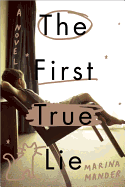The First True Lie
by Marina Mander
A slim and unusual novel translated from the original Italian, The First True Lie by Marina Mander is the story of a young boy who conceals the death of his mother for as long as he can. In an unnamed city in Italy, Luca lives with his single mother and their cat, Blue. His mother, an attractive and artistic woman, is always dating the wrong men--at one point, even a man Luca suspects is homeless. The toll of being a single mother is wearing on Luca's mother, and her life is fraught with a job she hates, pills, and therapy notes.
Luca perceives his mother's depression as an inability to cope with the demands of adulthood, noting: "Mama has a hard time with all the gys put together"--concepts like "psychology, energy, strategy, allergy." These are all adult words from his point of view. Meanwhile, Luca observes of his depressed mother: "She says that psychology's no use to her, that sciatica doesn't let her get to sleep, that no matter how much she sleeps she has no energy, that she has nostalgia for a man who's a man but you need a strategy to find him or else to make more money, that with the pollen every year her allergies just explode, and the vaccines aren't worth the money."
The picture painted in these words, even before Luca's mother's death, shows a woman on the brink of collapse. The depth of her devastation is something the adult reader can understand better than Luca; yet, even lacking the intellectual framework in which to grasp his mother's situation, Luca does know it all intuitively. His continuous use of profanity seems less like an attempt at accuracy on the author's part and more like an indirect cue signaling his unspoken rage. This faux-mature profanity is offset by Luca's vivid daydreams and the imaginary games he plays in which Blue is his personal assistant who can talk. Like the protagonist of The Curious Incident of the Dog in the Night-time, Luca tells the reader a series of emotional truths just by keenly observing.
Yet despite the emotional intensity of the events that unfold, Luca holds emotions at arm's length--perhaps sensing that if he allowed himself to experience them, the grief would be an agony. He chooses, instead, to pretend that he is grown up; that his mother's death has catapulted him to adulthood rather than reducing him to an orphaned state.
Luca himself is exceptionally bright, a fact his mother whimsically attributes to his having been born two months premature. When tragedy strikes, perhaps it is in part Luca's intelligence that both aids and paralyzes him: returning from school to find his mother dead in her bed--ostensibly from a sleeping pill overdose--Luca is immediately seized with the terrified thought of being placed in an institution for orphan children. Additionally, on a deeper level, the idea of being an orphan--and thereby somehow deficient, different from other children--holds an especial horror for Luca. For the remainder of the novel, while Luca pretends that catastrophe has not struck, that his life is normal, the chill of his new status in life creeps into the text in increasing degrees; more than anything else, The First True Lie is defined by its pervasive atmosphere of complete isolation. There is a concrete symbol for this too: the cold winds of February wafting through the windows of the apartment--which Luca must keep open due to the smell of his mother's corpse--represents the reality that constantly threatens to sweep away his world.
Before his mother's death, fatherless Luca already felt like an orphan. The stigma is ever-present, has come to define his self-identity in damaging ways. Luca thinks, "Adults say 'orphan' under their breath, like when they talk about diseases or the rent or bad things that happen to other people. There are lots of parents who decide to break up, lots of kids who see only one or the other parent, but not orphans, that's really, really bad, like you're missing a body part and everyone only sees the part that's not there. You're not what you are--you're what you're missing."
This perhaps is the idea at the heart of the novel: while Luca struggles to conceal what he is missing--a living parent--he is forced to confront who he is, the true self that emerges after everything else has been stripped away. To get there, he journeys through many fantasies and daydreams, all of which contain the yearning for a different reality; but in the end the reader knows--and we believe Luca knows, as well--that the winter air can't be shut out forever. --Ilana Teitelbaum









 How did the idea come to you? Was it painful writing from the point of view of such a tragic character?
How did the idea come to you? Was it painful writing from the point of view of such a tragic character? The setting seems intentionally vague--the characters have Italian names, but the cultural references are American and British. We don't know if the story takes place in a city or a suburb. Was this vagueness deliberate?
The setting seems intentionally vague--the characters have Italian names, but the cultural references are American and British. We don't know if the story takes place in a city or a suburb. Was this vagueness deliberate? What would you like readers to take away from The First True Lie?
What would you like readers to take away from The First True Lie?